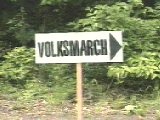Walking is a pretty inexpensive sport or vacation.
I just finished reading In the Garden of the Beasts, which is an interesting book and reminded me of a post hoc version of Nora Waln's The Approaching Storm, which sadly is out of print. The Larson book is an interesting insight, as was Waln's, into the slow creep of National Socialism into everyday life.
One of the interesting features of the Nazi regime, which was echoed, to some extent, in other countries, was the concept of Strength Through Joy, which encouraged workers to take more time off from work for inexpensive vacations. Since money was tight in those times, and unemployment was high, it made more sense to hire more people, pay them less, and give them more time off. Workers would go on inexpensive walking vacations or camping trips.
Today, this tradition continues - and has spread - in the form of Volksmarches. And here in Canada, walking and hiking seems to be quite popular. St. John's, Newfoundland, has installed walking trails (the Concourse) that traverse the city in many directions. And every Provincial and National Park has miles - or kilometers - of hiking trails from easy to challenging.
The idea did not originate with Hitler, of course. Many industrialists and Industrial Engineers in the 1930's thought along the same lines. If workers could have inexpensive and healthful vacations, it would be cheaper than paying them more money. Henry Ford experimented with model communities and forms of Corporate Socialism in this regard. Industrial Engineers such as the Gilbreths, touted ideas along this line - of making workers lives more productive by encouraging exercise, reading, culture, and enlightenment.
Today, that has largely changed. We are encouraged to consume, and consuming is seen as the ultimate goal of working. You don't work for a two-week walking vacation in the Alps, but for a Jet Ski or a Bass Boat. And workers accumulate such consumer goods at a rapid clip. When I worked for GM, the typical hourly worker I worked with had a motorcycle, a Camaro, a Winnebago, a Snowmobile, and a host of consumer products, all depreciating rapidly and all bought on time.
And of course, this was not by accident, but by design. Perhaps Henry Ford realized he needed more customers for his cars, and if his workers could not afford them, then demand would drop. So we were encouraged to work to consume, and to consume to drive up demand for work. It was circular reasoning and pretzel logic of the worst sort.
When we go to a "campground" or indeed, when "campers" arrive at our vacation island, they often are towing a plethora of motorized vehicles - sometimes in trailers behind trailers! One cannot camp out, it seems, without a motorcycle, a golf cart, an ATV, and of course a separate car for every member of the family. So when our campers arrive at the campsite, they come with a 40' fifth wheel trailer, towed by a crew cab 1-ton dually pickup, towing a Bass boat or Jet skis behind that. The kids arrive with their own cars, towing utility trailers with golf carts, ATVs, motorcycles, dirt bikes, and the like. You cannot recreate without consumer products - and you aren't having fun, it seems, unless an internal combustion engine is running somewhere, even if it is just the generator.
But the funny thing is, having less is often more. We have been living, for the last month in a 17-foot travel trailer that is smaller than a Supermax Prison cell. And that's double-occupancy, too! What I have learned is multi-fold.
First, you don't need a lot of space or a lot of things to live. A place to sleep, a place to cook and eat, a place to relax, and a bathroom. That's it. Yet we all have so much more than that and rarely find it satisfying.
Second, when you don't have a lot, you tend to make more use of public spaces, such as parks, streets, picnic areas, retail businesses and the like. When you have a large house with a 50" HDTV, you tend to stay home more, live a sedentary lifestyle, and not go out. Without all those distractions at home, public spaces are more compelling to visit.
Third, most of this sort of thing is free or cheap. Walking and hiking require little more than a good pair of shoes. Some folks like to expertize this with special clothing or those ski-pole-like walking sticks. But you really don't need all of that just to get out and get around.
But I think that many folks don't get that. A vacation requires a motor being run or a ride being ridden on, or some sort of "experience" that requires an admission fee, a ticket, or some other sort of cost. And perhaps this sort of approach is comforting - after all it is easier to follow the herd up the chute to the slaughterhouse as it is to get in line at Disney World.
And I am not knocking Disney World, either. It is fun. You should go sometime, if not just for the irony of it all. Branson is the same way. But having fun doesn't require a ticket stub, a can of gas, an internal combustion engine, a cooler full of crappy beer, or expensive specialized clothing or equipment.
And maybe those social movements of the 1930's were right in that regard. Having more time off is more important than having more things to play with - and no time to play with them, or money left to live on.


.jpg)



0 comments:
Post a Comment